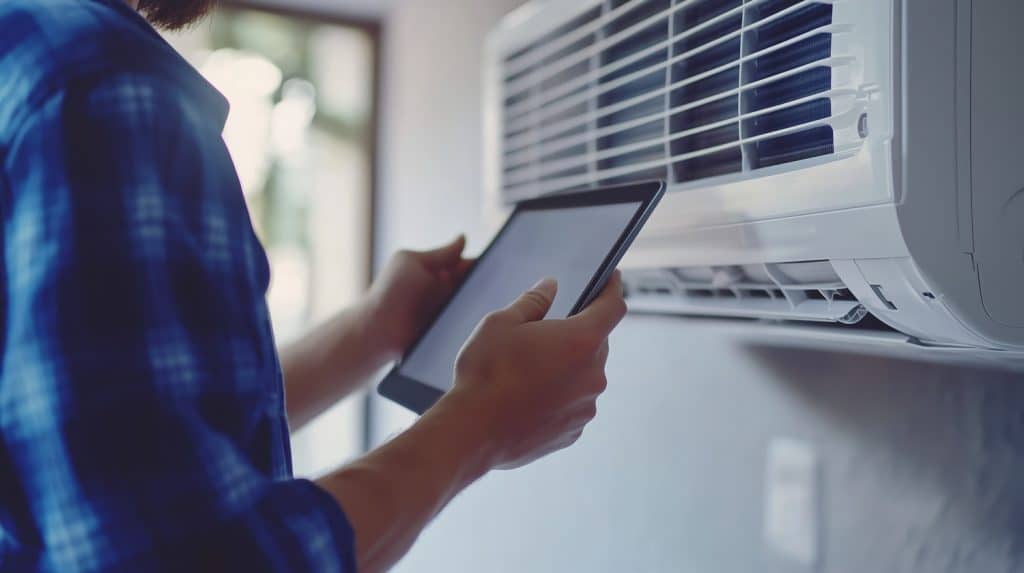Air quality inside your home directly affects your well-being, yet it’s often overlooked. Poor ventilation, allergens, and fluctuating humidity levels can lead to discomfort and long-term health issues.
Smart air conditioning systems offer more than just temperature control—they contribute to a healthier living environment by improving air circulation, managing humidity, and reducing indoor pollutants. Here’s how these systems can positively impact your home and health.
1. Optimized Air Circulation with Smart Zoning
Traditional HVAC systems operate on an all-or-nothing basis, simultaneously cooling or heating the entire home. With a smart system like MyPlaceIQ and other innovative HVAC solutions, you can control individual zones, directing airflow only where it’s needed for optimal comfort.
This reduces stagnant air and helps maintain a consistent, comfortable environment. By keeping air moving efficiently, these systems can also minimize the buildup of dust and allergens in unused rooms.
2. Consistent Humidity Control
Excess humidity creates a breeding ground for mold, bacteria, and dust mites. On the other hand, air that’s too dry can cause skin irritation and respiratory discomfort. Smart air conditioning systems monitor and adjust humidity levels automatically, keeping them in an optimal range. This balance reduces health risks and helps protect furniture, electronics, and structural materials from moisture-related damage.
3. Improved Filtration for Cleaner Air
Many smart technology AC systems have advanced features like filtration options that capture dust, pet dander, pollen, and other airborne pollutants. Some even include HEPA filters or UV light technology to neutralize bacteria and viruses. Regular monitoring through a smart app ensures that filters are changed on time, keeping your air clean and fresh without the need for constant manual checks.
4. Reduction of Allergens and Pollutants
Everyday activities introduce pollutants into your home—cooking releases fine particles, pet hair accumulates, and outdoor allergens make their way inside. Smart AC systems with integrated air quality sensors can detect these changes and adjust airflow or filtration settings accordingly. This proactive approach helps reduce allergy triggers and respiratory irritants, making the home environment safer for those with asthma or sensitivities.
5. Prevention of Mold and Mildew Growth
Mold thrives in damp, poorly ventilated spaces. Smart air conditioning helps prevent this by regulating temperature and moisture levels consistently. Some systems even have built-in alerts to notify you of excessive humidity, allowing you to address potential mold issues before they become a problem. Keeping humidity in check also reduces musty odors and maintains a fresher indoor atmosphere.
6. Energy Efficiency with Health Benefits
Energy-efficient cooling isn’t just good for your electricity bill—it also contributes to healthier indoor conditions. Overcooling can lead to dry air, while inconsistent cooling can create temperature fluctuations that trigger headaches and discomfort. Smart ACs optimize energy savings while maintaining stable conditions, preventing unnecessary strain on your body and reducing environmental impact at the same time.
7. Personalized Comfort and Sleep Support
Quality sleep is essential for good health, and temperature plays a major role in achieving restful sleep. Smart air conditioners allow you to set sleep-friendly temperature schedules, ensuring your bedroom remains cool without getting too cold. Some systems even offer adaptive features that adjust cooling based on your body’s sleep cycle, promoting deeper and more restorative sleep.
8. Remote Monitoring and Air Quality Insights
With smart AC systems, you can monitor air quality metrics and energy usage from your smartphone or remote control. Whether you’re at home or away, real-time updates provide insight into temperature, humidity, and pollutant levels. This data allows you to make informed adjustments and create a consistently healthy indoor environment. Some systems also feature smart home integration with assistants, making it even easier to manage indoor air conditions through voice commands.

9. Reduced Noise Pollution
Old air conditioning units can be noisy, disrupting sleep and concentration. Many smart ACs are designed with noise reduction technology, operating quietly while maintaining efficiency. This creates a more peaceful home environment, reducing stress and improving overall well-being.
10. Smart Maintenance Alerts for System Longevity
A poorly maintained regular air conditioner can circulate dust and bacteria instead of filtering them out. Smart air conditioning units send automatic maintenance reminders, ensuring filters are cleaned or replaced on schedule. Regular upkeep prevents system malfunctions and maintains optimal air quality over time.
Creating a Healthier Home with Smart Cooling
Investing in a smart air conditioning system, such as advanced Samsung air conditioners, is about more than convenience—it’s about creating an environment that supports your health every day.
From better air circulation to allergen reduction and sleep improvement, these systems play a key role in enhancing indoor well-being. By making informed choices in home climate control, you’re not just adjusting the temperature—you’re improving your quality of life.
